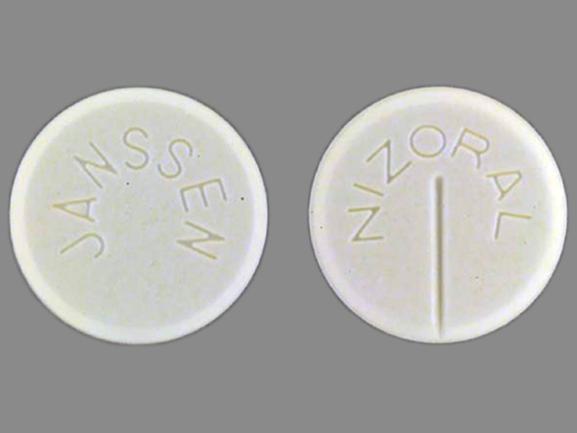Nizoral Disease Interactions
There are 4 disease interactions with Nizoral (ketoconazole).
Ketoconazole (applies to Nizoral) hepatotoxicity
Major Potential Hazard, High plausibility. Applicable conditions: Liver Disease
Serious hepatotoxicity including cases with a fatal outcome or requiring liver transplant have been reported. Some patients had no obvious risk factors for liver disease. Liver function tests should be performed prior to initiation of therapy and regularly during treatment in patients receiving prolonged therapy with ketoconazole, particularly those with a current or past history of liver disease. Therapy should be withdrawn if persistent elevations or worsening of liver enzyme levels occur, or if the abnormalities are accompanied by symptoms of possible liver injury. Since ketoconazole is primarily metabolized by the liver, empirically reducing the dosage may also be appropriate in patients with existing liver disease. The use of oral ketoconazole tablets is contraindicated in patients with acute or chronic liver disease.
References
- Knight TE, Shikuma CY, Knight J (1991) "Ketoconazole-induced fulminant hepatitis necessitating liver transplantation." J Am Acad Dermatol, 25, p. 398-400
- Duarte PA, Chow CC, Simmons F, Ruskin J (1984) "Fatal hepatitis associated with ketoconazole therapy." Arch Intern Med, 144, p. 1069-70
- Lewis JH, Zimmerman HJ, Benson GD, Ishak KG (1984) "Hepatic injury associated with ketoconazole therapy: analysis of 33 cases." Gastroenterology, 86, p. 503-13
- Bercoff E, Bernuau J, Degott C, et al. (1985) "Ketoconazole-induced fulminant hepatitis." Gut, 26, p. 636-8
- Stricker BH, Blok AP, Bronkhorst FB, et al. (1986) "Ketoconazole-associated hepatic injury: a clinicopathological study of 55 cases." J Hepatol, 3, p. 399-406
- Lake-Bakaar G, Scheuer PJ, Sherlock S (1987) "Hepatic reactions associated with ketoconazole in the United Kingdom." Br Med J (Clin Res Ed), 294, p. 419-22
- van Parys G, Evenepoel C, van Damme B, Desmet VJ (1987) "Ketoconazole-induced hepatitis: a case with a definite cause-effect relationship." Liver, 7, p. 27-30
- McCance DR, Ritchie CM, Sheridan B, Atkinson AB (1987) "Acute hypoadrenalism and hepatotoxicity after treatment with ketoconazole." Lancet, Mar, p. 573
- Gradon JD, Sepkowitz DV (1990) "Massive hepatic enlargement with fatty change associated with ketoconazole." Ann Pharmacother, 24, p. 1175-6
- (2002) "Product Information. Nizoral (ketoconazole)." Janssen Pharmaceuticals
- Chien RN, Yang LJ, Lin PY, Liaw YF (1997) "Hepatic injury during ketoconazole therapy in patients with onychomycosis: a controlled cohort study." Hepatology, 25, p. 103-7
Azole antifungals (applies to Nizoral) QT prolongation
Moderate Potential Hazard, Moderate plausibility. Applicable conditions: Arrhythmias
Some azole antifungals have been associated with prolongation of the QT interval on the ECG. Rare cases of QT prolongation and torsade de pointes have been reported during postmarketing experience; such reports usually involved seriously ill patients with multiple confounding risk factors, such as structural heart disease, electrolyte abnormalities, and concomitant medications. These drugs should be administered with caution to patients with potentially proarrhythmic conditions. Concomitant use with other medications that have potential to increase the risk of cardiotoxicity should be avoided.
References
- (2001) "Product Information. Nizoral (ketoconazole)." Janssen Pharmaceuticals, 1992
- (2002) "Product Information. Diflucan (fluconazole)." Roerig Division
- (2002) "Product Information. Sporanox (itraconazole)." Janssen Pharmaceuticals
- (2022) "Product Information. Sporanox (itraconazole)." Janssen Pharmaceuticals
- (2002) "Product Information. VFEND (voriconazole)." Pfizer U.S. Pharmaceuticals
- (2006) "Product Information. Noxafil (posaconazole)." Schering-Plough Corporation
- (2021) "Product Information. Tolsura (itraconazole)." Mayne Pharma Inc
Ketoconazole (applies to Nizoral) achlorhydria
Moderate Potential Hazard, High plausibility.
Nizoral (brand of ketoconazole) tablets require acidity for proper dissolution and absorption. Therefore, the drug may not be effective in patients with achlorhydria. Taking the medication with an acidic beverage such as orange or cranberry juice may help, but an alternative antifungal agent should be considered.
References
- Lake-Bakaar G, Tom W, Lake-Bakaar D, et al. (1988) "Gastropathy and ketoconazole malabsorption in the acquired immunodeficiency syndrome (AIDS)." Ann Intern Med, 109, p. 471-3
- Mannisto PT, Mantyla R, Nykanen S, et al. (1982) "Impairing effect of food on ketoconazole absorption." Antimicrob Agents Chemother, 21, p. 730-3
- Daneshmend TK, Warnock DW, Ene MD, et al. (1984) "Influence of food on the pharmacokinetics of ketoconazole." Antimicrob Agents Chemother, 25, p. 1-3
- Daneshmend TK (1990) "Diseases and drugs but not food decrease ketoconazole "bioavailability"." Br J Clin Pharmacol, 29, p. 783-4
- (2002) "Product Information. Nizoral (ketoconazole)." Janssen Pharmaceuticals
Ketoconazole (applies to Nizoral) adrenal insufficiency
Moderate Potential Hazard, Moderate plausibility.
Ketoconazole tablets decrease adrenal corticosteroid secretion at doses of 400 mg and higher. Adrenal function should be monitored in patients with adrenal insufficiency or with borderline adrenal function and in patients with prolonged periods of stress due to major surgery, intensive care, etc.
References
- (2001) "Product Information. Nizoral (ketoconazole)." Janssen Pharmaceuticals, 1992
Nizoral drug interactions
There are 814 drug interactions with Nizoral (ketoconazole).
Nizoral alcohol/food interactions
There is 1 alcohol/food interaction with Nizoral (ketoconazole).
More about Nizoral (ketoconazole)
- Nizoral consumer information
- Check interactions
- Compare alternatives
- Reviews (4)
- Drug images
- Side effects
- Dosage information
- During pregnancy
- Drug class: azole antifungals
- Breastfeeding
Related treatment guides
Drug Interaction Classification
| Highly clinically significant. Avoid combinations; the risk of the interaction outweighs the benefit. | |
| Moderately clinically significant. Usually avoid combinations; use it only under special circumstances. | |
| Minimally clinically significant. Minimize risk; assess risk and consider an alternative drug, take steps to circumvent the interaction risk and/or institute a monitoring plan. | |
| No interaction information available. |
Further information
Always consult your healthcare provider to ensure the information displayed on this page applies to your personal circumstances.


